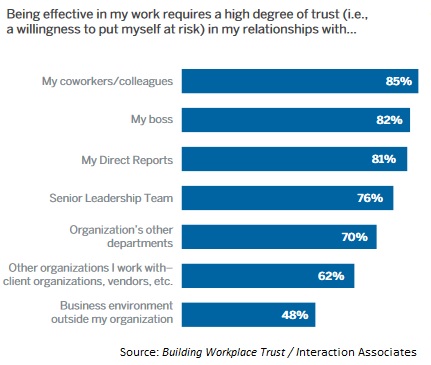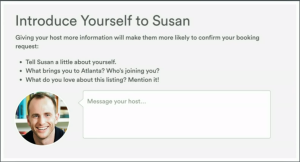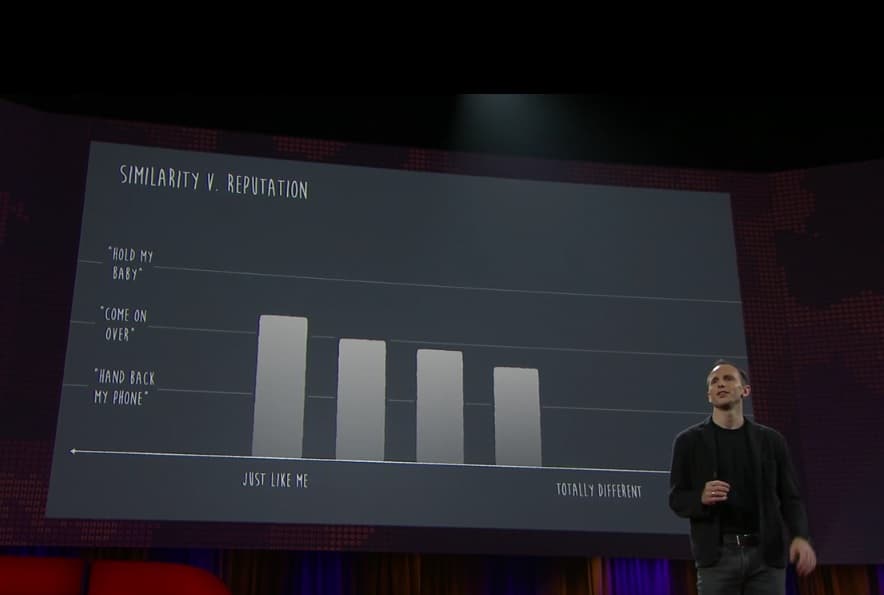How important is trust for an organization? In a survey by Interaction Associates, over 80% of employees said being effective in their work requires a high degree of trust in their co-workers (85%), boss (82%) and direct reports (81%). For any organization to grow, innovate and succeed, having trust is key.
Yet, a study by EY found that only 49% of employees trust their boss/team. Even less trust their organization (46%). Another recent study by Edelman showed that the lower you go in the hierarchy of an organization, the more trust decreases, with employees being less likely to trust company leaders than peers.
Learn what leaders can do to build trust in their organization. Read “Leaders – They Don’t Trust You.”
Today trust is more important than ever. With the speed of innovation companies need to be fast to stay on top of new trends.  To create more agile organizations we need more agile skill development and learning. The need for a faster rate of innovation is driving managers to give their employees more autonomy over their work. This in turn is leading to a rise in remote working. However, for this more autonomous system to work, a high level of trust is an absolute must.
To create more agile organizations we need more agile skill development and learning. The need for a faster rate of innovation is driving managers to give their employees more autonomy over their work. This in turn is leading to a rise in remote working. However, for this more autonomous system to work, a high level of trust is an absolute must.
The difficulty is, if you only interact with your team on a working level is it possible to create trust? The leaders of the new ‘sharing economy’ may have the answer.
Getting strangers to trust each other
In her TEDTalk. “The Currency of the New Economy Is Trust,” Rachel Botsman expounds on the idea that we are currently going through a collaboration revolution. Companies like Airbnb, Lyft and Bla Bla Car are at the forefront of the paradigm shift towards a “sharing economy.” People are trusting strangers to stay in their apartment alone for a weekend and pick them up from the airport on time.
[clickToTweet tweet=”Employees don’t trust the people they work with, but they’ll rent a room to a stranger. What HR can learn from Airbnb” quote=”How are these companies getting people to trust strangers in their own home, when so few of us trust the people we work with daily?”]
Botsman explains that in this new economy trust is essential. The way people create trust is by sharing feedback with each other after exchanging services. In her view, all future transactions will be based on an amalgamation of the feedback we receive online from different sources, creating a virtual ‘reputation’ for ourselves. However, at first sight this might be disconcerting for some. Do we really want an online reputation following us around?
Overcoming the stranger-danger bias
Co-founder of Airbnb, Joe Gebbia explains how the company tackled the trust problem in an insightful TEDTalk. From its inception the company had to deal with what it called the ‘stranger-danger bias.’ Getting people to invite strangers to lounge on their couch and sleep in their bed when they’re not around seemed an impossible task. One reason for this is what psychologists call homophily or ‘similarity bias.’ People are much more ready to trust someone who is similar to them. Without any way of connecting on a personal level, a stranger is too much of a risk.
Here’s how Airbnb set about to change this by designing for trust:
Creating a profile — The company found that having hosts and guests create a profile with their pictures and links to social media helped to create a more familiar picture of the other person. Your potential host is no longer a stranger, but someone who likes to travel, like you, and enjoys the same music. However, a 19-year-old traveler and a 65-year-old retiree may not necessarily find they both have a penchant for vegan food and heavy metal music. The next challenge was coming up with a way the young company could overcome similarity bias.
Reviews — Airbnb conducted a study with Stanford University into similarity bias. What they found was that high reputation actually beats high similarity. According to Airbnb, a host without reviews is 4 times less likely to get a booking than a host with at least one. A host with 10 reviews is 10 times more likely to book their home, thereby counteracting the potential for similarity bias. If you think about anytime you’ve ever used Airbnb it makes sense. You are much more likely to trust someone who has 10 reviews than someone who seems nice but has no reviews at all.
Reviews are therefore one of the most successful ways Airbnb creates trust between users. Like Botsman, the company calls this their ‘reputation system.’ Guests and hosts equally receive reviews from each other each time they use Airbnb and this information is displayed on their user profile.
However, the team also noticed a tendency for users to give overly positive reviews to avoid receiving negative reviews in return. To encourage good quality feedback, Airbnb decided to make reviews available only after both guest and host had finished completing them. This way both parties won’t feel swayed by the feedback given by others, resulting in more objective assessments. This small change actually increased the rate and objectivity of the reviews that were given.
Prompting more interaction — Another way they encourage trust is by getting people to have more meaningful interactions with  each other. The challenge was to get guests and hosts to exchange just the right amount of information during their initial contact. Share too little and people will not gain a sense of trust, share too much and a red light might go off. To solve this dilemma, the Airbnb team put design thinking to use. Gebbia explained that when sending a request to a potential host, the system actually guides users to share more with prompts that ask you to tell the host a bit about yourself. They also used the size of the box to suggest a certain length.
each other. The challenge was to get guests and hosts to exchange just the right amount of information during their initial contact. Share too little and people will not gain a sense of trust, share too much and a red light might go off. To solve this dilemma, the Airbnb team put design thinking to use. Gebbia explained that when sending a request to a potential host, the system actually guides users to share more with prompts that ask you to tell the host a bit about yourself. They also used the size of the box to suggest a certain length.
Precautions in place — Finally, to consolidate a sense of trust, Airbnb acts as a guarantor for transactions. The company withholds all payments until 24 hours after the guest has checked in to ensure there are no problems from either side. This adds an extra layer of confidence, giving both parties somewhere to turn if one side does not follow through on their agreement.
How does this fit in the workplace?
You may be thinking, sharing a car with someone and then rating them on their driving skills is nowhere near equivalent to the relationships that form in the workplace. In reality, with websites like Glassdoor and Indeed, companies are already developing their own online reputations based on employee reviews.
The potential impact of these reviews can be explained by the similarity bias. Jobseekers are going to be much more apt to believe in the reviews of current employees than in company recruitment efforts or statements by the CEO.
Creating trust between employees and managers should therefore be at the top of every HR department’s agenda. Using best practices from the sharing economy can be easier than you think.
The importance of feedback
Essentially, what Airbnb and other companies have proven is that opening yourself up to feedback will increase trust in the eyes of others. But, as in the sharing economy, similarity bias also exists in the workplace. As mentioned, Edelman’s survey showed that employees are much more likely to trust their peers than managers or executives. The more reviews a person has the easier it’ll be for them to overcome similarity bias. This is where 360-degree feedback can help. Even if employees are more likely to trust their co-workers, the more managers open themselves up to feedback, the more employees will trust them.
Getting co-workers and managers to give each other more meaningful feedback is the next challenge. Rather than asking for feedback in general, asking for feedback on specific skills or sharing positive feedback on a weekly basis will prompt the provider to think more deeply about how the recipient could improve or what areas they are excelling in.
At the same time, if a strong sense of trust hasn’t been developed yet, employees may be apprehensive to give open honest feedback at first. Starting off by using a system that allows for anonymity can help.
If you choose not to give feedback anonymously, make HR a guarantor in the feedback transaction. Tools like those we offer at Impraise allow employees to flag inappropriate feedback, immediately alerting HR to the situation. The extra layer of trust this creates is likely the reason that only 2% of feedback has been flagged so far.
By opening themselves up to reviews from reports and peers, managers can build a greater sense of trust in the office.
